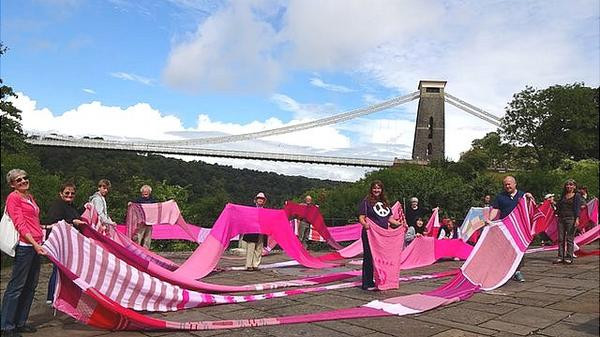Nuclear Weapon Campaigners Knit Seven-Mile 'Peace Scarf' Protesting Trident Replacement

Protesters have unveiled a seven-mile "peace scarf" as part of a protest against replacing the UK's Trident nuclear weapons system.
The scarf, which took thousands of hours and volunteers all over the world to knit, was stretched for the seven miles between the atomic weapons establishments in Aldermaston to Burghfield in south-east England. These sites provide the warheads for the submarine-launched missile system.
Activists from the Campaign for Nuclear Disarmament (CND) and Action Atomic Weapon Eradication (AWE) have spent the past eight months putting the scarf together.
The Wool Against Weapons campaign has been almost two years in the making, and has received contributions from over 5,000 knitters from around the UK and as far as Africa, the Middle East, and South America.
It was created from hundreds of pieces of knitting made across the world and took about five hours to assemble. Hundreds of volunteers assembled the scarf using ribbons and safety pins.
Symon Hill, from Action AWE, said: "It's a creative way of making a point that is shared by millions of people around the world, which is concern about the impact of nuclear weapons if they're used.
"It costs £100bn to renew Trident at a time when we are experiencing cuts to public services and the welfare state that we need."
CND's general secretary Kate Hudson said: "People are fed up with the government saying there's not enough money for vital public services while waving through the purchase of a £100bn Cold War weapons system.
"Trident doesn't keep us safe because it encourages nuclear proliferation. We can't afford it at a time when we're slashing public services. And its use would be illegal because it kills indiscriminately.
"Every single bit of scarf joined together between the UK's nuclear bomb factories represents a voice calling for reason over dogma, for peace over war – a step towards real global security and a triumph over an outdated and dangerous Cold War mentality."
A final decision on whether to renew Trident, the UK's nuclear deterrent, is due in 2016.
We can't wait for the big roll out of the 7-mile peace scarf against Trident on Saturday!
http://t.co/JlmTXSu0nx
https://t.co/UJ9OLBRWcV
— CND (@CNDuk) August 7, 2014© Copyright IBTimes 2025. All rights reserved.





















